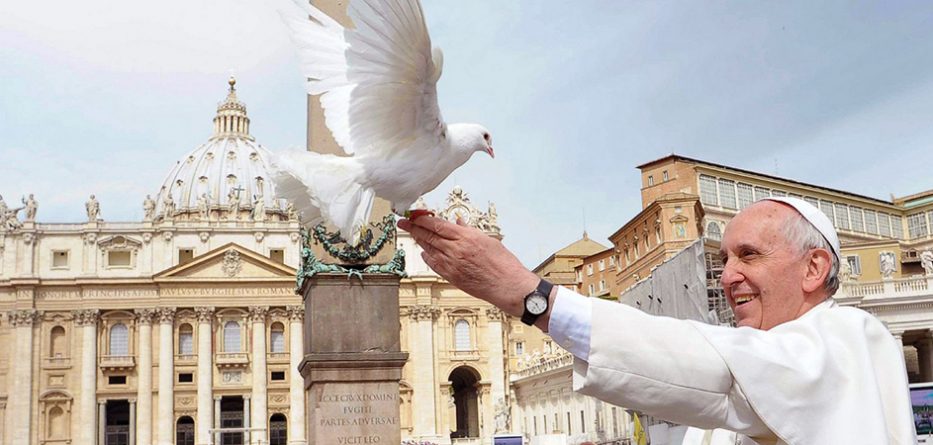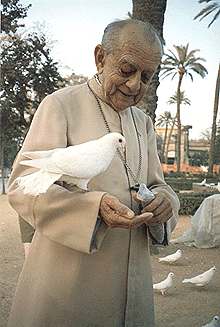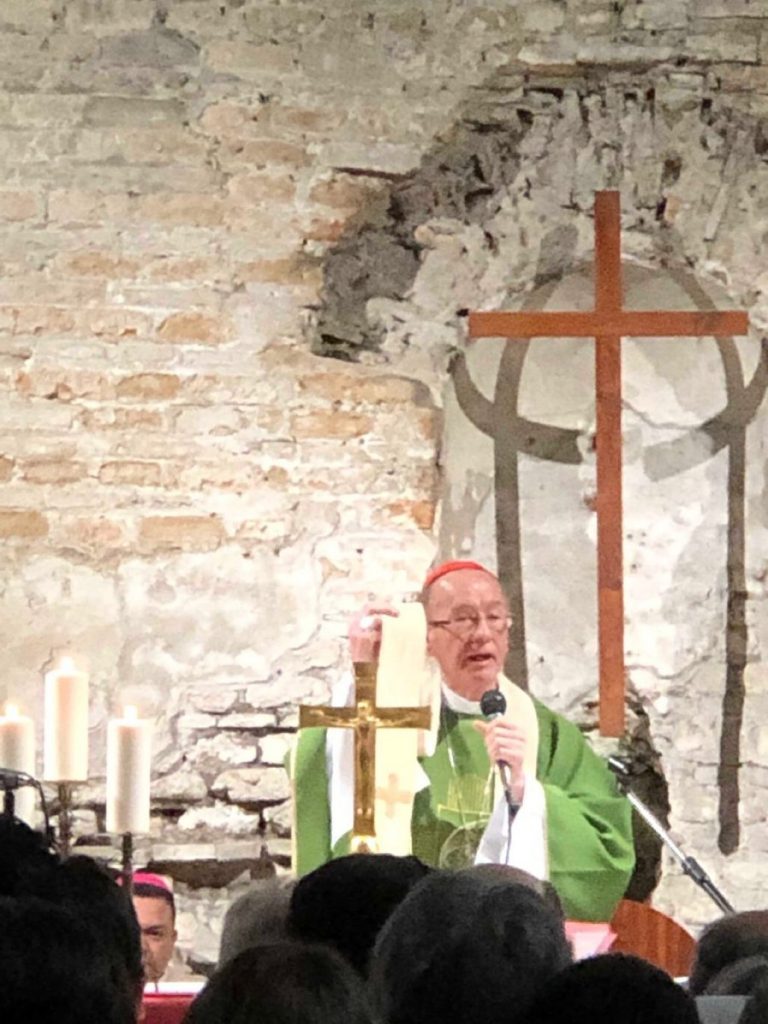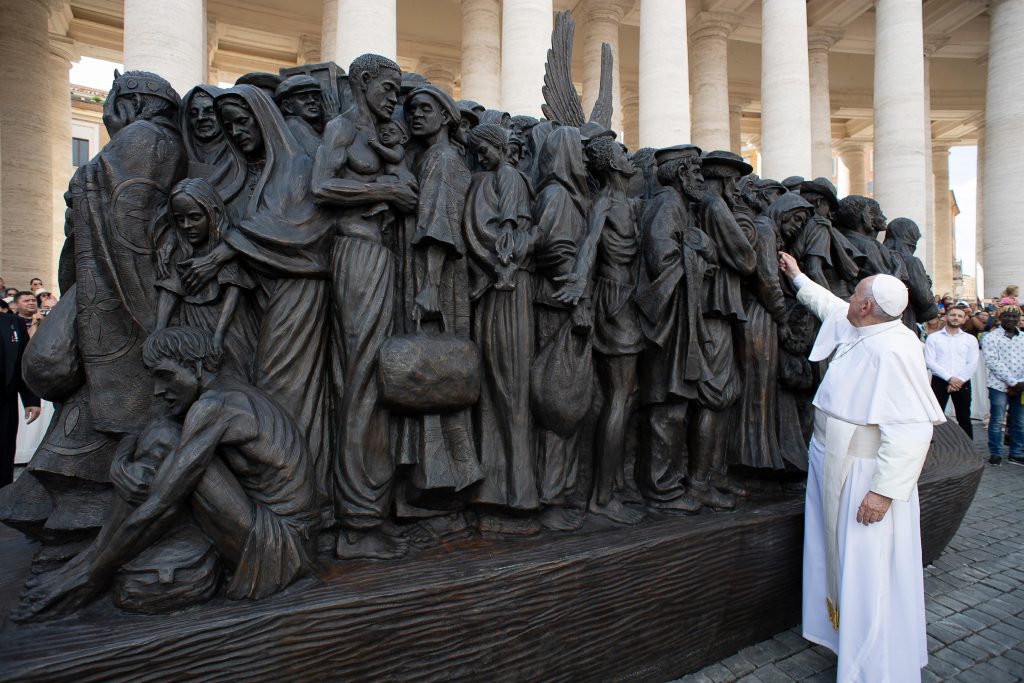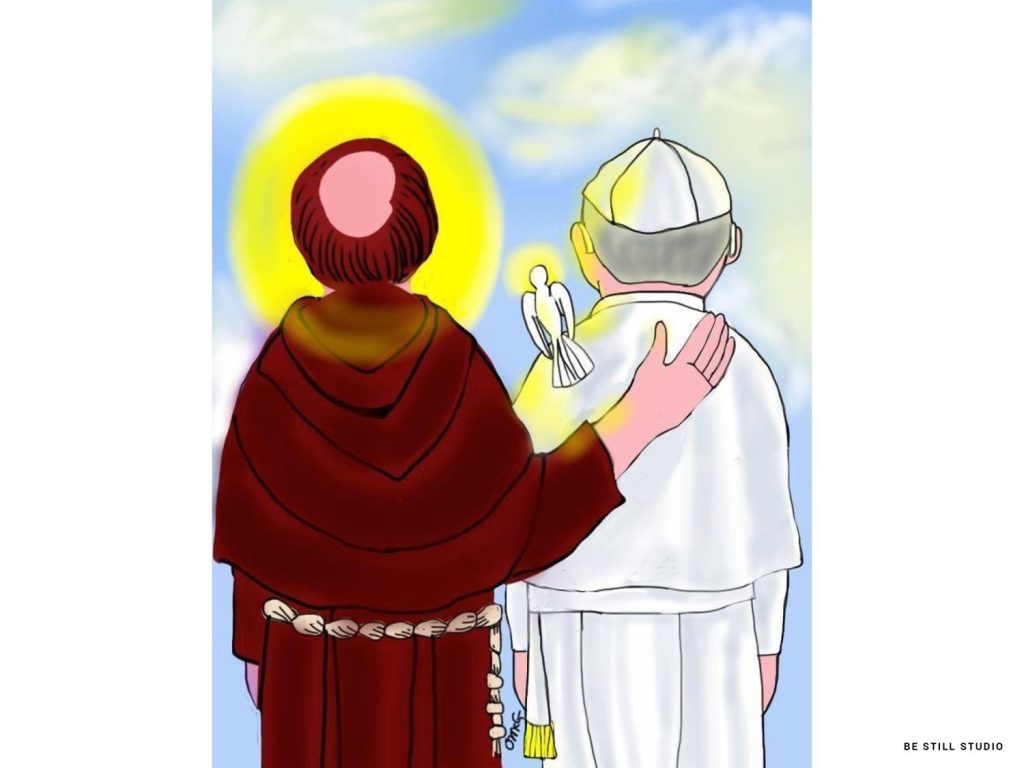Letters from the Synod is written by Br Mark O’Connor FMS.
Br Mark was in Rome for the Synod of Bishops for the Pan-Amazon Region, providing regular updates and news from the Synod.
Letter Number Six.
Accept the Surprises: The Amazonian Synod and trusting the Spirit
Dear Friends,
A critical issue, for each of us, is the question of trust. It is also a vital issue for our Church.
For in the deepest part of ourselves, we are all called to negotiate, what the psychologist Erik Erikson names, as the struggle between ‘trust and mistrust.’
Within our souls and within the soul of the Church, this drama continues to play out.
Indeed, one could make a compelling case, that most problems and conflicts in our lives and within the Church, have actually little to do with ‘theology’ but arise when we ‘cannot let go’ in trust and persist in mistrust of the others around us.
And, of course, if you can’t trust others, you have to ‘control’ them… and what havoc that wreaks in people’s lives, especially in the Church!
Instead, our challenge as Christians, is to constantly pray and discern, so as we can discover God’s Spirit presence in our ordinary lives. We are constantly called to open ourselves up to the abundant surprises of the Spirit of the Risen Jesus of Nazareth.
God is, after all, a surprise!
That is why a prophet like Dom Helder Camara – whose spirit is very much present in this amazing Amazonian Synod of grace and hope – could write:
Accept surprises
that upset your plans,
shatter your dreams
and give a completely different turning to your day.
And who knows…
to your life!
It is not chance.
Leave the father free himself
To weave the pattern of your days.
– Dom Helder Camara
Yes, the Spirit’s action is always a surprise.
Indeed, each Pope is a surprise and brings a gift of the Spirit to the Church. That is a core truth of our Tradition.
John XXIII was a surprise.
In recent decades, a saintly Polish pope brought surprising hope and liberation to millions, arising from the immense sufferings of the peoples of Eastern Europe.
A German pope, who one day might be a Doctor of the Church, powerfully illustrated how real authority is surprisingly willing to ‘let go’ and make way for others when the time comes.
And now we have a new surprise since 2013, Pope Francis.
He is the Spirit’s gift from Latin America and its long history of suffering, martyrdom, option for the poor and defence of the Indigenous peoples who have been (and still are) brutally repressed.
Trust the Spirit under the leadership of Pope Francis
Francis is also the surprise of the Spirit, as he especially follows in St Paul VI’s footsteps.
He is a pope who intends to implement the Second Vatican Council in fresh, new ways, using his Ignatian spirituality as a resource for the Universal Church.
That is why, it is no exaggeration, to say that Francis’ calling of the Synod of the Amazon, is one of the most significant ecclesial moments in the last 50 years.
For a brilliant deeper exploration of why this is so, please read Christopher Lamb’s seminal article.
Very briefly, always remember, Vatican II was a special surprise that few expected or even wanted!
That is why, it is no exaggeration, to say that Francis’ calling of the Synod of the Amazon, is one of the most significant ecclesial moments in the last 50 years.
As first, Karl Rahner SJ and now ecclesiologists like Massimo Fagioli point out, in that great Council, we saw for the first time the emergence of the global Church.
The Council marked the end of the period when Catholicism as a whole could be equated with its expression in the forms of Graeco-Roman, Mediterranean, or European culture.
Instead, we are witnessing the birth of a new multicultural Catholicism in which all the regional Churches may be expected to interact, mutually criticising and enriching one another.
In calling and participating so humbly in the Synod of the Amazon, Francis is showing how each of local Churches, in union with the Universal Church, can continue to implement Vatican II and to preach the Good News of Jesus to all around them.
Hence the importance of our upcoming Australian Plenary Council. But more of that later.
And so, Francis urges us to do this by walking and together as a Church in what he calls the ‘synodal’ path. Just a few days ago he outlined what that practically means.
Pope Francis insisted that the Church must be “on the move, always broadening her space.”
He reminded us “that the ecclesial method for resolving conflicts is based on dialogue made up of attentive and patient listening and with discernment carried out with the light of the Spirit.”
Synodality, the pope said, is “the presence of the Holy Spirit, otherwise it is not synodality, it is a parlour, a parliament, something else.”
For “[t]he Church is not a fortress, but a tent capable of expanding and offering access to everyone,” he said.
“The Church is ‘going out’ or it is not Church, either it is walking, always widening its room so that all may enter or else it is not church.”
For further exploration of how Pope Francis is trying to lead and reform our beloved church, I highly recommend Austen Ivereigh’s marvellous new book to be published on November 5 –Wounded Shepherd: Pope Francis and His Struggle to Convert the Catholic Church.
Hence for me, one of the great and most moving moments of the Synod, was attending the Eucharist at the Catacombs of Domitilla last Sunday, where many Bishops recommitted themselves to the famous Pact of the Catacombs.
Here, during Vatican II in 1965, and largely inspired by Dom Helder, some Church’s leaders committed themselves to a more Gospel based style of leadership. More information on the 2019 newly signed Pact here.
And Cardinal Cláudio Hummes OFM preached at the Catacombs that Sunday morning – holding up Dom Helder Camara’s stole which he was wearing.
The great Franciscan Cardinal, who is the Relator of the Synod, proclaimed that the Amazonian Synod is the direct fruit of the Second Vatican Council.
He also reminded us that money is at the root of all resistance to the Kingdom of God!
The greed of some multinationals and governments in the Amazon and the ongoing farces about the Vatican finances and the endless attempts to stop Pope Francis’ reforms, made this only too poignant an observation.
Mistrust and ‘stunts’
But there are some inside the Church who are arrogantly determined to oppose the Second Vatican Council.
This small and well organised group of media people are just Pope Francis haters.
Their one and only aim is to foster mistrust of the Synod of the Amazon and especially Pope Francis.
In essence, they regard Vatican II as a mistake or worse. They are the ‘alternative Synod’ Pope Francis begged people not to form.
Of course, we all accept that there are many theologies and spiritualities within the ‘large tent’ of Catholicism.
But these people in question are simply acting in bad faith. They are the very same group of people who have tried to sabotage all of Pope Francis’ Synods. The internet is their tool of dissent, subterfuge and lies.
In the Synod of the Family, they used the sufferings of married people as cannon fodder to attack Francis’ pastoral theology of accompaniment.
The very same people last year were the architects of an attempted coup to bring down the Pope using the ravings of the discredited Archbishop Vigano.
We all know that what these people and their media agitprop defenders really wanted was to throw the Synodal process into the Tiber!
And here at the Amazonian Synod they have picked on, bullied and demeaned the Indigenous peoples of the Amazon by obsessively focussing on some innocent religious symbols.
They have cruelly manipulated and worse, used, the plight of the Amazonian Indigenous peoples as part of a war against the successor of Peter.
Apart from their ridiculous charges of idol worshipping, they have gone further and praised criminal actions taken where these Amazonian symbols were stolen earlier in the week and then thrown into the Tiber River.
In the Church of Transportina, a few days later, I spoke to wonderful religious sisters at their stall, where they show how they minister in the Amazon.
They were in tears at the callous cruelty of these so-called defenders of “orthodoxy”.
We all know that what these people and their media agitprop defenders really wanted was to throw the Synodal process into the Tiber!
Thank God, Pope Francis has clearly and definitively answered these agents of racism and mistrust, with a powerful statement that we should all read and ponder over.
They are ideologues who would be better off examining the shocking racism – closer to home – being played out on the border of the USA and Mexico.
Read what a prophetic USA bishop cries out on this tragedy here.
The Holy Spirt at work: surprises of the Spirit from the Synod of the Amazon
After three weeks of listening to some 200 four-minute interventions from cardinals, bishops, priests, and women and men religious, as well as women and men representing the Indigenous peoples of the Pan-Amazonian region and digesting 800 pages of report from the small discussing groups, the final document was released Saturday night October 26.
And what a beautiful and prophetic document it is!
The final document is in Spanish and whilst I have a draft English translation only, the final English version will appear this week probably at www.vaticannews.va/en.html.
All the paragraphs in the final synod document were passed with the two-thirds majority of the Synodal delegates
Meanwhile, this link provides an excellent summary
In closing the Amazon Synod on Saturday night, Pope Francis gave a powerful talk.
He began by stressing: “If everything continues as it was, if we spend our days content that ‘this is the way things have always been done,’ then the gift vanishes, smothered by the ashes of fear and concern for defending the status quo.”
Pope Francis, then went on to urge people to concentrate on what is the heart of this prophetic document: the call to conversion. Namely, pastoral, cultural, ecological and synodal conversion.
He also directly addressed those outside the Synod who have tried to manipulate the Synod and we all knew who he was talking about…
Francis is not afraid of these sowers of discord and hatred. These elites, he said, “love no-one and think they are with God.
“We should not be prisoners of selective groups who will focus on just a tiny bit of the Synod and deny the [wider] diagnosis or message”.
And Pope Francis went on to admit that the Synod’s discussion on women “falls short” of explaining who women are in the church, particularly “in the transmission of faith, in the preservation of culture.
As he said with considerable passion, “I would just like to underline this: that we have not yet realised what women mean in the Church,” but instead “we focus on the functional aspect, which is important,” but is not everything.
Pope Francis concluded by informing us that he plans to write his post-Synodal exhortation before the end of the year, in order to maintain the Synod’s momentum for reform and while the topics discussed are still “fresh” in people’s minds.
For a good summary of his speech see this article here.
When the final document was officially released an hour later, the newly created Jesuit Cardinal Michael Czerny gave us one of the outstanding moments of the Synod.
His brilliant and masterly witness thrilled many of us present.
Cardinal Czerny began by emphatically stating the core message of the Synod of the Amazon: the native people of the Amazon asked the Church to be their ally, and the Church’s response is “yes!”
It was a powerful response to the poignant pleas of the Indigenous people
One group of Indigenous people from Brazil said this recently: “We don’t harm anyone, why is there so much hate?”
Cardinal Czerny stressed that: “We have to do better in bringing the Good News of Jesus Christ to everyone.
“Without conversions there are really no new paths” for the Church.
The Cardinal said that the ecological crisis demanded radical action, and “that if we don’t change, we won’t make it”.
He said that in Africa people talked about the “curse of oil”, because of the exploitation it would lead to, and stressed that the Church does not want resources of the Amazon to become a curse.
Cardinal Czerny also recently said, “The fires brought the thing home to us in a way that graphs or other visuals didn’t. If we insist on tearing up the trees and digging up the land because we can’t live without the metals and the gold and the wood for our fancy furniture, you can fill out the rest.”
It was a sacred moment to treasure all my life, to hear this man of peace and love, so eloquently outline the Synodal document that night.
I can, for now, only give you a few selective, but certainly not exhaustive, highlights from this 32-page document.
“The fires brought the thing home to us in a way that graphs or other visuals didn’t. If we insist on tearing up the trees and digging up the land because we can’t live without the metals and the gold and the wood for our fancy furniture, you can fill out the rest.”
First, its analysis is stunning and very challenging to us all.
- The document calls for a Church which is missionary, synodal and immersed among the people. It calls for “new ways” of being the Church.
- It takes conversion inside the Church as its theme. It offers a powerful call to protect the Amazon region a placed described as “a wounded and deformed beauty, a place of suffering and violence.”
- Listening to the cry of the earth, the poor, and the peoples of the Amazon calls for a “true and integral conversion, to a simple and model style of life, all nourished by a mystical spirituality in the style of St Francis of Assisi.”
- At the heart of the document was the need to bring the good news to the Amazon, a mission that includes safeguarding the Indigenous people, cultures and land that are under constant threat of annihilation.
- “The Amazon rainforest is a ‘biological heart’ for the increasingly threatened earth” the Amazon members said and is on “a rampant race to death. It is scientifically proven that the disappearance of the Amazon biome will have a catastrophic impact on the planet as a whole!”
- At the Synod, “We discovered that the mighty waters of the Spirit, similar to those of the Amazon River, which periodically overflow, lead us to this overflowing life that God offers us to share in the announcement of the Gospel,” the document said. The crucial role of Amazonian ecosystems in regulating the global climate and as an important source of fresh water that “connects ecosystems, cultures and the development of the territory.”
- The Amazon faces environmental threats that make it “a wounded and deformed beauty, a place of suffering and violence,” the bishops wrote. Violence against nature, in the form of rampant extraction of resources, unsustainable development and climate change, also have “serious social consequences.”
- To bring greater awareness and responsibility to the Universal Church, the Synod document proposed a definition of ecological sin as “an action or an omission against God, against one’s neighbour, the community and the environment.”
- The document also proposed the creation of “special ministries for the care of our ‘common home'” that would promote ways of caring for the environment “at the parish level.”
- “The future of the Amazon is in the hands of us all, but it depends mainly on our immediately abandoning the current model that is destroying the forest, not bringing well-being and endangering this immense natural treasure and its guardians,” the document said.
Secondly, also offered the Church an opportunity to reflect “on how to structure the local churches” in order to address the needs of a “church with an Amazonian face.”
Here some of ways the Church must seek new pathways of ministry were addressed.
- A special “Amazonian Rite” sensitive to the traditions of the Indigenous peoples, was proposed for those suffering most as a result of the environmental destruction in the region. This “Amazonian Rite” must be sensitive to the “traditions, symbols and original rites” of the Indigenous communities. The question it tackles is how to better insert the Gospel into the life of the Amazonian people.
- The document establishes parameters for the ordination of “esteemed men of the community,” commonly referred to as viri probati. Such circumstances would be open to those who “’have had a fruitful permanent diaconate and receive an adequate formation for the priesthood, having a legitimately constituted and stable family, to sustain the life of the Christian community through the preaching of the Word and the celebration of the Sacraments in the most remote areas of the Amazon region.’ The proposal is meant to offer a solution to the remote regions of the Amazon where some Catholic communities only receive the sacraments once or twice a year.”
- Members of the Synod of Bishops for the Pan-Amazon Region also asked that women be given leadership roles in the Catholic Church, although they stopped short of calling for women deacons. However, the Pope has recommissioned a group to look again at this issue which was addressed a few days ago in a remarkable intervention by a bishop who spoke for many of the Synod fathers.
Accepting surprises and ‘letting go’ in trust: some questions for the Church in Australia
So, what might all this mean for our church in Australia?
At the very least, the Synod of Bishops for the Pan-Amazon Region, can provide us with an opportunity for a good ‘examination of conscience’ as we ponder our future in the forthcoming Plenary Council.
I am reminded of a story the famous spiritual writer Fr Henri Nouwen told. Henri took his elderly father to the circus. He became enamoured by the trapeze artists known as The Flying Rodleighs.
He was mesmerised by the way they would fly through the air, perform a variety of flips, and land safely in the arms of the catcher – a fellow trapeze artist whose responsibility was to catch the flyer.
Their secret was that the flyer does nothing and the catcher does everything!
In our journey, as the pilgrim people of God in Australia, perhaps we also have to let go and trust in the Spirit of Jesus who is our great catcher.
Perhaps this grace-filled Amazonian Synod therefore poses some important questions for us as a local Church?
Here are just a few that come to me immediately:
- Can we let go and trust the remarkable call to conversion coming from Pope Francis and especially the Synod of the Amazon? Certainly, the Amazonian Synod show us how one regional local church is taking up Francis’ call for pastoral, cultural and ecological conversion. Let’s be more specific.
- Can we Australian Catholics let go and find new pathways to pastoral conversion? Can we let go and trust the surprising graces being offered us, as we imagine pastoral leadership for the future? I love our Australian poet James McAuley’s line, “I am anxious for that loss by which the Spirit gains.” We all know that at the moment of our own individual deaths, we will be faced with this very same choice. Can we overcome mistrust and instead trust in the catcher – the Spirit? These days, as a Church, post the Royal Commission, there is an enormous mistrust of our Church as a credible public institution in Australian society. We can speak but is anyone any longer listening? But this should not daunt us as we too contemplate the future, just as the Amazonian Church has done so prophetically, in recent weeks. We Catholics, in this Great Southern Land of the Holy Spirit, are called to live the paschal mystery anew. Certainly, this must involve us all in a deeper living and dying in Christ Jesus. This might well involve some new wineskins.
- Our cultural conversion must address who we give priority to as a Church. How can we renew our option for the poor in a consumer culture that increasingly sees the poor as a nuisance and a distraction? Most critically: can we let go and trust and learn from the experience of our Indigenous sisters and brothers. We must not forget the prophetic challenge of then-Pope John Paul II at Alice Springs in 1986. “And the Church herself in Australia will not be fully the Church that Jesus wants her to be until you have made your contribution to her life and until that contribution has been joyfully received by others” Pope John Paul II said.
- Regarding our ecological conversion, can we let go of our sinful apathy about the environment and the plight of our “Mother Earth” (St Francis)? Might not the coming Plenary Council be the moment where we undertake to very seriously make Pope Francis’ encyclical a central priority of every Catholic home, parish, school, diocesan agency and Bishop’s witness and teaching in the coming decade? Maybe our bishops might even solemnly vow and publicly sign a document similar to the Pact of the Catacombs? Here is a way where they could publicly pledge to live more simply and renew their efforts exercise leadership in a more Gospel-centred way.
- And what about “Synodal conversion”? Can we, as an Australian Church, learn from the process of the Synod of the Amazon? Their final document calls for Synodal conversion. Why? Because this ‘Synodal’ way is so rich, as the thought of the recently canonised St John Henry Newman also shows us. Can we especially ‘let go’ of some past ecclesial structures of authority that need to be reimagined? While it is part of our DNA, as Catholics, that we believe in an Apostolic Church – united under the successor of Peter – that does not preclude imagining new models of exercising authority with certain parameters. This might include the re-examination of the Revised Code of Canon Law (1983), particularly Canon 129. This canon specifies that only those who have received sacred orders are qualified for the power of governance, also called the power of jurisdiction. But might not baptism also be a source of jurisdictional power if the Church decides such? For this reason, Mark Patrick Hederman OSB points out: “What we are talking about is clericalisation of the Church we all belong to. Whether priests are men or women, or both, we cannot have a situation where only priests can exercise power. This amounts to a clerical oligarchy in which lay people have no say in matters of legislation or governance and no real or effective participation in the running of the Church. This has to change and any ambiguities about it must be ironed out.”
Conclusion: A final word from the Synod of Bishops for the Pan-Amazon Region
A new statue was recently installed in St Peter’s Square for the first time in 400 years .
The life-size sculpture, titled Angels Unaware, depicts a group of 140 migrants and refugees from various cultural backgrounds and time periods travelling together on a boat.
There are figures representing Jews fleeing Nazi Germany, Irish people escaping the potato famine, Cherokee travelling the Trail of Tears, as well as modern-day Syrians fleeing war.
A pair of angels’ wings peek out from the crowd, suggesting the sacredness of migrants’ lives.
If you look closely the Holy Family are on the very inside centre of the crowd of refugees who are searching for refuge.
The artwork was inspired by a biblical passage, Hebrew 13:2, that encourages Christians to show hospitality to strangers, since by doing so, “some have entertained angels unawares.”
Might this sculpture also speak to our situation as Church in Australia?
For we, too, have also been through rough storms as a Church in recent years.
Aren’t we Australian Catholics deep down also ‘refugees, itinerants and pilgrims’ – on a journey into the heart of the mystery of our merciful loving God?
And yes, sometimes anxiety threatens to overwhelm us.
And yet, like the peoples of the Amazonian region, we are also are members of the Body of Christ, here in Australia.
May we Australian Catholics learn from how the Spirit of Jesus of Nazareth has been abundantly poured out during the prophetic Synod of the Amazon.
May we pray for and act in solidarity with the Indigenous peoples of the Amazon and our own Indigenous peoples, who have both suffered so much more than we can ever imagine.
Let’s pray finally for our own wounded, yet graced local Church in Australia.
Pray and ponder once more over Dom Helder’s poem.
May it give us strength to continue our pilgrim journey and to overcome mistrust with trust in our risen Lord Jesus, who alone is our hope.
Accept surprises
that upset your plans,
shatter your dreams
and give a completely different turning to your day.
And who knows…
to your life!
It is not chance.
Leave the father free himself
To weave the pattern of your days.
– Dom Helder Camara
Br Mark O’Connor FMS is the Vicar for Communications in the Diocese of Parramatta and the Pope Francis Fellow, Newman College, University of Melbourne.
The Special Assembly of the Synod of Bishops for the Pan-Amazon Region was held in the Vatican from 6 to 27 October. For more information, click here.




